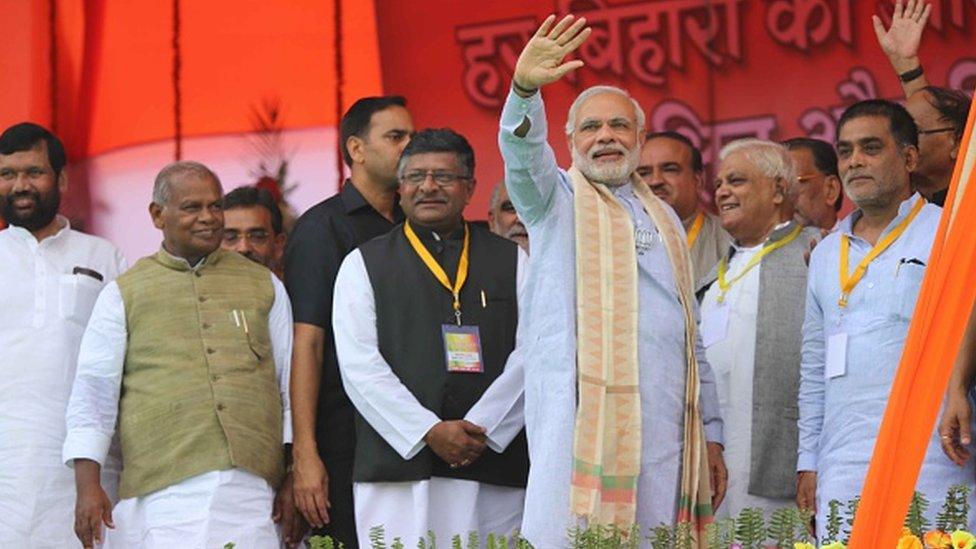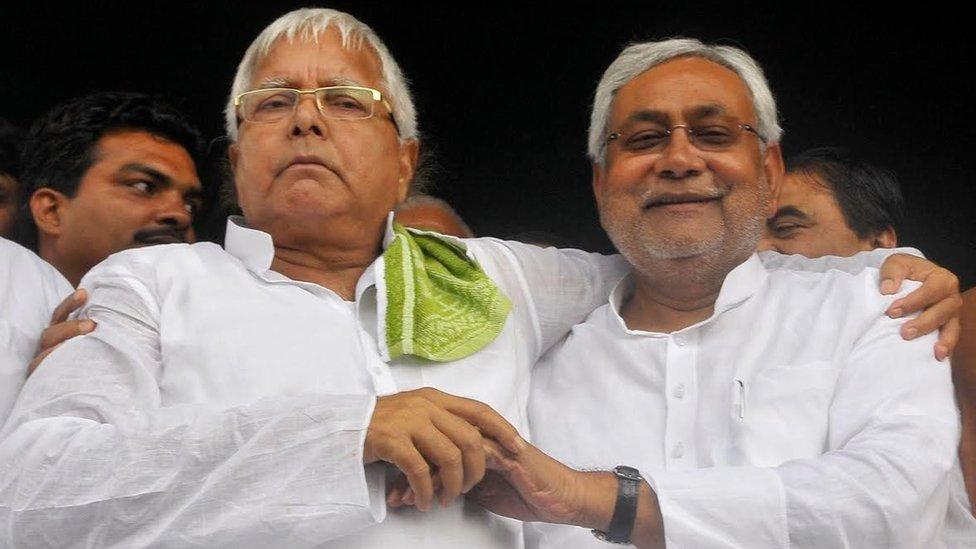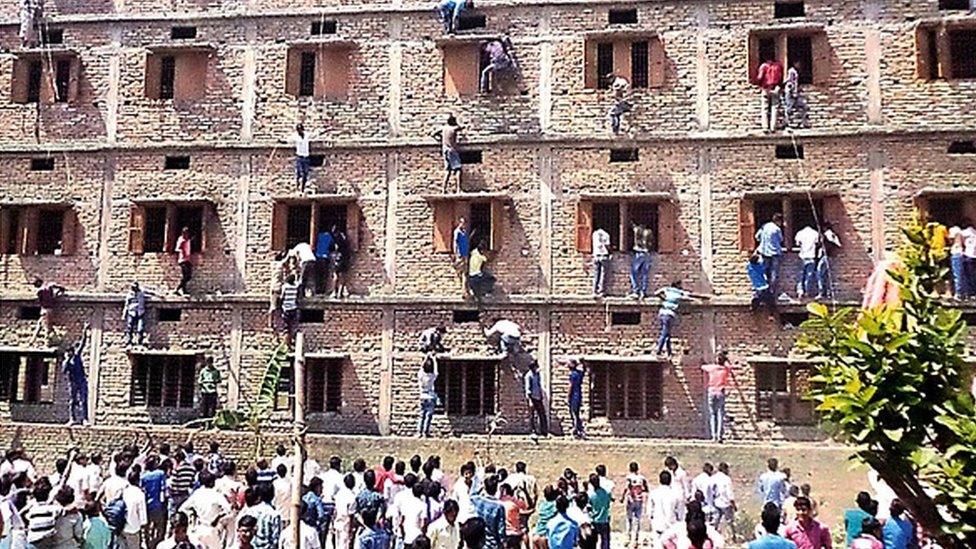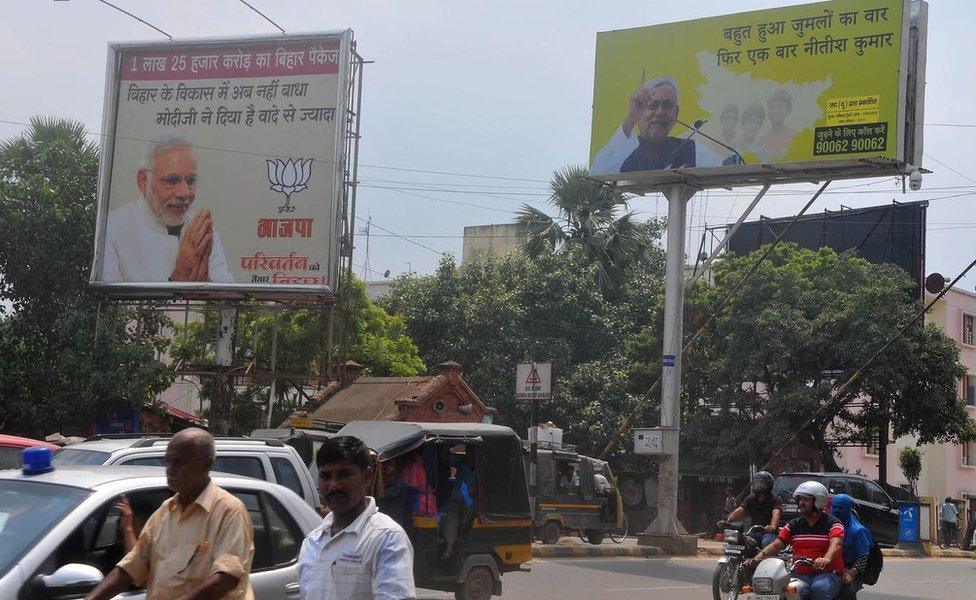Why Bihar polls are a test of Modi's popularity
- Published

Mr Modi is leading the campaign for his party in Bihar
So who will win this year's most-talked about election in India?
On Wednesday, election authorities announced that polling will be held in the state of Bihar in October and November.
More than 66 million voters in what is one of India's most populous and poorest states are eligible to cast their ballots in 243 seats between 12 October and 5 November. Votes for the five-phase poll will be counted on 8 November.
The BJP led by Prime Minister Narendra Modi and which holds power nationally, will be battling a "grand" coalition of local parties, led by Nitish Kumar and Laloo Prasad Yadav, two powerful regional politicians.
Mr Kumar and Mr Yadav lead rival parties - JD(U) and RJD respectively - and are foes-turned-uneasy friends. Between the two of them, they have ruled Bihar for 20 of the past 25 years.
Controversial
Mr Kumar is a socialist and a popular backward caste leader who has fashioned himself as a modern politician who prefers development over caste-based cronyism.

Bihar elections
Total voters: 66.8 million
Constituencies: 243
Number of polling stations: 62,779
Voting will be held in five phases from 12 October to 5 November
First phase: On 12 October in 49 constituencies
Second phase: On 16 October in 32 constituencies
Third phase: On 28 October in 50 constituencies
Fourth phase: On 1 November in 55 constituencies
Fifth phase: On 5 November in 57 constituencies
Vote counting: 8 November
Source: Election Commission of India

The controversial Mr Yadav is an ideological brother of Mr Kumar, but a polar opposite: a populist politician with an earthy charisma who is loved and loathed in equal measure. Mr Yadav's critics never cease to remind you of his 15 years of "misrule" and his involvement in a corruption scandal, when he was convicted for embezzling state funds intended for cattle fodder.
So why is Bihar's election significant?
For one, it will undeniably be a crucial test of Mr Modi's popularity, who swept to power in Delhi last summer. In the absence of a popular local leader, the prime minister is leading the campaign for his party and has addressed four well-attended campaign meetings so far.

Laloo Prasad Yadav (left) and Nitish Kumar (right) have joined hands to fight the BJP

Bihar is often in the news for the wrong reasons, like mass cheating in examinations
A BJP win will further demoralise India's opposition parties - who are yet to recover from last's year debacle in the general election - and will reinforce the belief that the Hindu nationalist party remains invincible.
Party leaders will also crow that February's drubbing in state polls in Delhi at the hands of an upstart anti-corruption party was an exception.
Tight contest
On the other hand, a win by the "grand alliance" will give the opposition a major shot in the arm. They will be enthused to forge similar alliances to contest upcoming major elections in states like Uttar Pradesh - which promises the mother of all battles - in 2017.
Observers say it is looking like a very tight contest with BJP holding the edge.
Although his government's performance is seen to be sliding, Mr Modi's popularity remains considerably high, a year after his landslide win.
Despite some noise about development triumphing caste in Bihar, caste is expected to be the determining factor in the election. "Caste-based voting will be as sharp as it has been in the past," says political scientist Sanjay Kumar.
In a tightly-contested election where caste and identity are likely to fetch more votes than anything else, BJP hopes to wean away a tiny slice of young voters, who are impressed with Mr Modi's charisma and inspirational talk.
Mr Modi has run an astute, finely tuned campaign: he has, at once, invoked his humble caste background, and spoken about jobs being the only way out of poverty.

The Bihar polls will be keenly contested
That may resonate with many voters in what a commentator called India's "unrivalled basket case".
With 8% of India's population squeezed in under 3% of its area, Bihar is desperately crowded and poor. "There is always something to protest about in Bihar," wrote Sankarshan Thakur, biographer of Nitish Kumar and Laloo Yadav. "Pensions, wages, unemployment, too little job reservation or too much of it, usurped land, landlessness, hunger, rape, atrocity."
But, in the end, says Bihar-based social scientist NK Chaudhury, next month's election marks the "full blown return" of caste and identity politics in Bihar.
"The grand alliance between Mr Kumar and Mr Yadav is driven by caste. BJP is talking about caste. Bihar politics has regressed with this election," he says.
Just when you thought caste was on the retreat in India's febrile politics, it is back with a vengeance. The more things change, the more they remain the same.
- Published25 May 2015